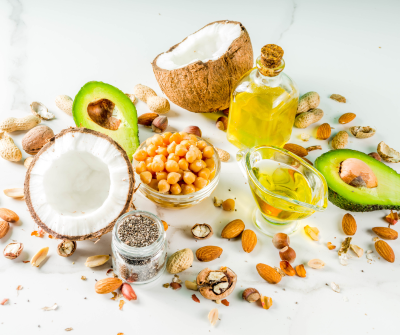Three Myths About Fat
 In case you have not heard the news yet, a low-fat diet is NOT the answer for preventing heart disease. It is true that consumption of fat can lead to heart disease, but there is a very specific type of fat and other factors that needs to be considered.
In case you have not heard the news yet, a low-fat diet is NOT the answer for preventing heart disease. It is true that consumption of fat can lead to heart disease, but there is a very specific type of fat and other factors that needs to be considered.
Let’s first review the types of fats there are. It is important to note that for each type of fat it is generally a composition of the different types of fat. There is no 100% purely unsaturated or saturated fat. For example, olive oil is about 14% saturated fat and 86% unsaturated fat, and beef fat is about 52% saturated and 48% unsaturated fat.
-
Saturated:
Fat that is solid at room temperature and is found often in meat, dairy, and coconut oil. -
Mono- and polyunsaturated:
Fat that is liquid at room temperature and found in nuts, seeds, and avocado. -
Trans fat:
Fat that is made during the processing of food and has been shown to increase risk of heart disease. We want to avoid this fat at all costs.
Myth 1: We don’t need fat.
This is indeed very false. Our bodies need fat. Period. Fat supplies energy to your body, is a part of every cell, provides essential fatty acids our bodies cannot make, and helps regulate hormones, reproduction, immune function, and aids in the absorption of certain nutrients. Based on that information, fat seems pretty important to me!
Myth 2: Fat increases body weight.
While this may seem logical to assume, it is in fact false. Studies have shown that individuals who eat a diet moderately or high in fat lose the same amount, or more, than their counterparts who eat a low-fat diet. Between carbohydrates, protein, and fat, fat does have the highest calorie content per gram at twice as much. So, it is wise to watch total fat intake as it is higher in calories. However, if you consume more carbohydrates and protein than your body needs, those too can be turned into fat and stored in the body.
Myth 3: Fat raises cholesterol.
Mono- and polyunsaturated fats can help reduce ‘bad’ cholesterol (LDL) and increase ‘good’ cholesterol (HDL). Saturated fat has been shown to raise cholesterol. The American Heart Association recommends reducing saturated fat to less than 6% of total daily calories for those trying to reduce cholesterol. To re-emphasize myth 1, we need fat, so make sure that you are consuming unsaturated fats! Aim to replace your saturated fat with unsaturated fat to keep your cholesterol numbers within normal range.
In summary, we should keep our fats in check and prioritize heart healthy unsaturated fats over saturated fats. If you are looking to reduce your fat intake, it is advised to not go and swap refined carbohydrates and sugars in place of fat. Excess consumption of these can lead to heart disease and diabetes as well! The last parting words is to keep portion sizes in check. The truth is that most serving sizes at restaurants are super-sized and serve us way more carbohydrates, unhealthy fats, sugars, and calories than needed. As previously mentioned, these excess calories from protein and carbohydrates can be turned into fat which in turn can lead to excess weight and chronic disease. And remember, adding olive oil to a hamburger and French fries does not make it healthy. We want to eat a diet rich in fruits, vegetables, whole grains, lean proteins, and healthy fats in order to truly keep our bodies healthy and chronic disease at bay.
Want more great food tips, recipes and nutrition info?
Sign up to receive In Good Health each month in your email inbox.